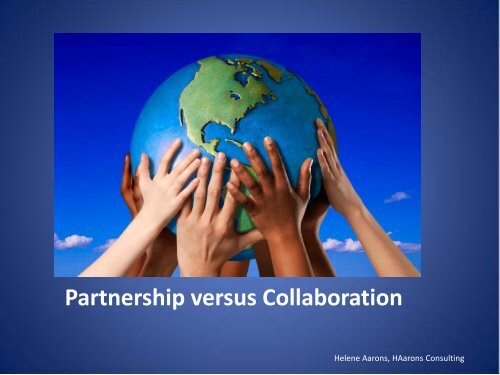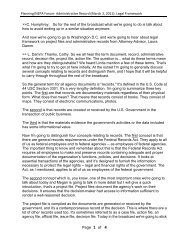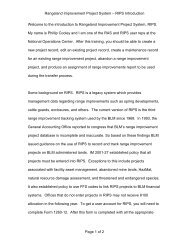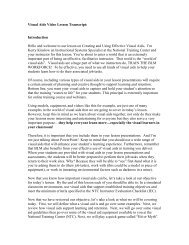Partnership versus Collaboration
Partnership versus Collaboration
Partnership versus Collaboration
- No tags were found...
Create successful ePaper yourself
Turn your PDF publications into a flip-book with our unique Google optimized e-Paper software.
<strong>Partnership</strong> <strong>versus</strong> <strong>Collaboration</strong><br />
Helene Aarons, HAarons Consulting
What is a partnership<br />
• A relationship created through an<br />
expressed or implied commitment<br />
• Between two or more parties who<br />
• Join together to achieve common goal<br />
• Combine their assets to accomplish<br />
the goal
<strong>Partnership</strong>s work best when…<br />
• The common goals are<br />
better achieved together<br />
than separately<br />
• An evident and tangible<br />
benefit to all partners<br />
• Effective fundraising tools<br />
in place<br />
• Good governance practices
A STAKEHOLDER<br />
A stakeholder is<br />
an individual,<br />
group or<br />
organization who<br />
is impacted by a<br />
process or<br />
decision, but not<br />
necessarily<br />
actively involved<br />
A COOPERATOR<br />
A cooperator is an<br />
entity actively<br />
involved in a<br />
process or<br />
decision-making<br />
activity and/or<br />
sharing of<br />
resources, in<br />
essence, a partner
<strong>Collaboration</strong> is<br />
an open and<br />
inclusive process,<br />
a tool to engage a<br />
broad array of<br />
diverse entities to<br />
come together to<br />
find solutions for<br />
issues/problems
<strong>Partnership</strong>s are relationships……….
<strong>Collaboration</strong> is a process, a decisionmaking<br />
tool to find the best creative<br />
outcome for an issue/problem
PARTNERSHIPS<br />
Short or long-term<br />
Informal to formal relationships defined<br />
by different partnership arrangements<br />
Participants may represent a single<br />
constituency<br />
Choice of decision-making tools<br />
Commitment to an individual mission,<br />
but understand their partner’s mission<br />
Individuals retain their authority<br />
Enhances own and each other’s capacity<br />
PARTNERSHIP WHICH USES A<br />
COLLABORATIVE DECISION-MAKING<br />
PROCESS<br />
Long-term<br />
Formal relationships defined by different<br />
partnership arrangements<br />
Participants represent a broad range of<br />
community interests<br />
Decision-making tool, often consensus<br />
or modified consensus<br />
Commitment to a common vision<br />
Individuals retain their autonomy<br />
Enhance own and each other’s capacity
Stakeholder<br />
Cooperator<br />
Partner<br />
Collaborator<br />
Using the above, explain which definition<br />
best describes the participation in your<br />
current partnership effort
More about <strong>Collaboration</strong>
Why use a collaborative process<br />
• Opportunity to bridge traditional divides<br />
between entities in various land uses<br />
• Proven track record in ensuring public<br />
lands are managed in an inclusive way<br />
• One way of assuring public access to and<br />
understanding of management decisions
Best Practices<br />
• The process is open, inclusive,<br />
transparent, accessible, and tailored to<br />
local needs.<br />
• Meetings are civil and safe. No bullies<br />
allowed.<br />
• Deliberations are thoughtful, frank, and<br />
never rushed.
Best Practices Continued<br />
• There is an agreed-upon way to make<br />
decisions.<br />
• Commitments that are made are<br />
honored. Trust is built on that<br />
confidence.<br />
• It’s a team effort. You win, you lose,<br />
• you temporize as a team.
There is no<br />
one right<br />
way to<br />
collaborate
Does having a collaborative process<br />
guarantee success<br />
No.<br />
But……..<br />
Putting your<br />
heads together<br />
will feel better<br />
than knocking<br />
them together.
When to use a collaborative process<br />
• Problem beyond the ability of a single<br />
individual or group to handle.<br />
• The issues are appropriate.<br />
• The time is right.<br />
• Key people/organizations are willing to<br />
come to the table.
Not every project will require or be<br />
conducive to collaboration<br />
Some important questions to ask<br />
• What is the scale of the project<br />
• What is the nature of the conflict Is the<br />
issue about information sharing or about<br />
values
• Is your partnership using a collaborative<br />
decision-making process<br />
• If yes, describe the factors that made you<br />
decide to create a collaborative<br />
partnership<br />
• If not, explain the factors that made you<br />
decide to not use a collaborative<br />
decision making process.

















